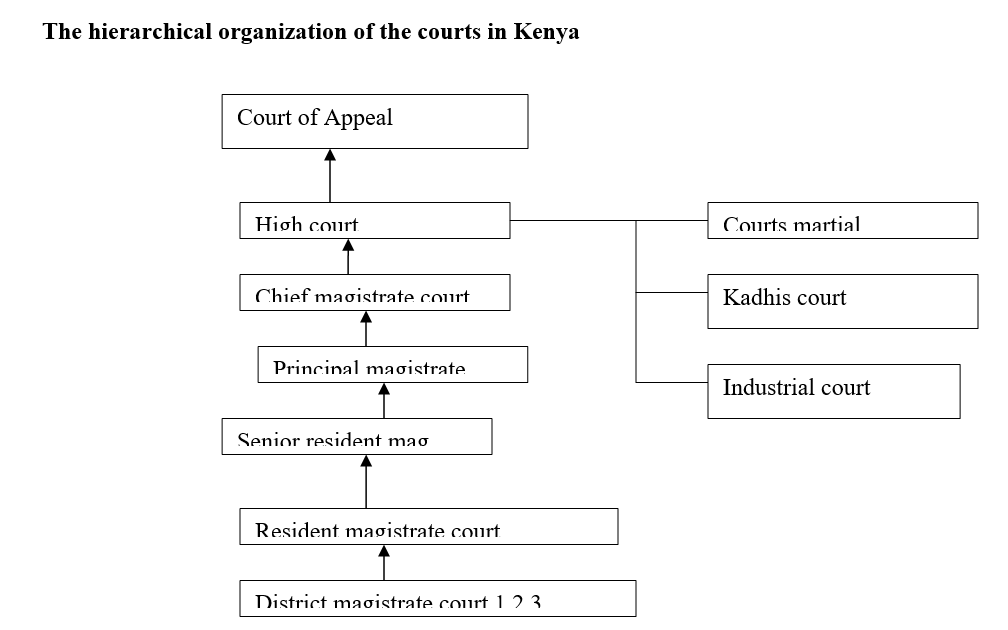Law is a set of rules or principles established by the government of a society to regulate the conduct or behavior of its people in order to maintain the stability and justice in that society or a country.
The law defines the legal rights and duties of the people and also provides a means of enforcing these rights through law enforcement agencies, courts, legislations, regulatory agencies.
Major divisions of law/ Sources Of law
- International law; governing more than one country who have some common characteristics.
- National law; laws governing a particular country.
- Municipal law/local authority law; governing activities of municipal.
Sources of law in Kenya
- Constitution of Kenya
- This is the supreme law of any kind; in Kenya this is not an exception.
- It sets out the guidelines on how the country is to be governed and lays down the guiding principles on laws of the land.
- Section 3 of the Kenyan constitution states that any law which contradicts is considered void i.e. not legally applicable.
- This therefore means that all other laws of the land have to be based on to support the provisions of the constitution.
- Legislation
These are laws passed by parliament to deal directly with specific aspects of the laws e.g. the penal code deals with criminal law while the employment act addresses issues pertaining to workers rights.
However these laws have to be in cons lance with and not a contradiction to the constitution; where they don’t, the offending sections the whole act may be declared unconstitutional.
- English common law/common law
Are rules that evolved overtime in England from common usage until they came to be recognized as laws.
These were common laws, England also referred to as Doctrine of Equities and statutes of generic application. The British ‘imported’ these laws to Kenya when the country was declared a colony of the British empire in 1897.They only applied to situations where they are relevant and where there exist no written laws in a particular issue.
They only apply in Kenya in so far as the specific circumstances of the Kenyan people allow for their applicability.
- African customary laws
This applies to cases of personal law nature where at least one of the parties is a member of a particular community whose customs is being involved.
If the other party is a non member of that community, then he/she must nonetheless voluntarily submit to agree to be bound by that very same custom provided that the same is not repugnant to morality and justice.
For example, this law does not apply in cases of criminal nature such as rape, assault, incest or murder.
It should also be constituent with any written laws; they regulate the conduct and behavior of individuals of that community.
- Judiciary precedents
This involves a body of cases developed allowing judges to refer to past cases in making the decisions. This leads to the doctrine of judicial precedents. Under this doctrine, a judge is required to follow an earlier court decisions where deciding a case with similar circumstances.
- Islamic laws
Administered by the Kadhis courts;
Organization of Judiciary in Kenya
Judiciary is that arm of the Government charged with the responsibility of enforcing laws in the court system; it is headed by the Chief Justice.
The structure/hierarchy of the Kenyan court
The hierarchy of the Kenyan court refers to levels of arrangement of court system from the senior to the lowest level.
Judge; professionally qualified and equipped with professional doctrines to pass judgement on serious cases.
Magistrate; that one who makes judgement on less serious cases.

Areas of responsibilities of Chief Justice
- Chief justice is the head of the judiciary and has responsibilities of leading.
- Each of the courts is limited in jurisdiction in terms of how much monetary sums or amounts may be awarded in civil cases (pecuniary jurisdiction) and what sentences can be passed by them in criminal cases.
- The Government structurally has a geographical jurisdiction which means a lower court in a certain district may not ordinarily entertain cases from another district.
High court
- Has unlimited original jurisdiction and can hear cases regardless of where they originate from a district different from where that particular court is situated.
- Cases that require the determination of the rights of the party through the prerogative orders are only determined in the high court. This is effected by way of application for judicial review urging the courts to conduct a review of a specific order matter or issues or sets of issues.
- All murder cases have to be conducted in the high court.
- In civil cases, the lower courts can only award monetary compensation of up to 1 million shillings and therefore any one who files an amount higher than this has to file it in high court.
- However there are few selected magistrates especially in large towns who may be allowed to award more than 1 million.
- Constitutional cases are instituted in the high court for the chief justice is required to appoint a two judgement to entertain such judges.
N/B: Any case beyond the high court will be handled in the court of appeal.
